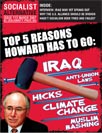i
Rate This

(
Article: From Socialist Perspective)
There’s a powerful myth about capitalism, put about by politicians,
bosses and the media alike – that it’s about “risk taking” and “wealth
creation”, and that the rest of us should be grateful to capitalists
for investing and giving us all jobs.
But most of us can recognise something quite different about
capitalism – that it’s a fundamentally unjust system. Corporations
controlled by a tiny minority control society’s wealth and productive
power. The majority of people can survive only by selling their ability
to work to the capitalists.
The Sydney Morning Herald’s economics columnist at the end of
January showed how these two things fit together: “When business people
focus on the risks of incurring certain expenses, it’s not long before
they come up with the perfect way to ‘manage’ those risks: shift them
onto the shoulders of their employees”.
Contrary to the myth, workers are the key wealth creators, but the
goods and services that workers produce belong not to them, but to
their bosses. Workers produce what society needs – in workplaces that
they neither own nor control, working under bosses they don’t choose,
and earning only enough to live from one month to the next.
Whatever the mythology, every capitalist knows that workers are the
source of their profits. While raw materials are worth a set amount,
capitalists can “stretch” the workers’ ability to work. They make
workers work longer hours, or make them work as hard and as
“productively” as they can while they’re at work.
That’s what the increased “flexibility” that Howard’s WorkChoices
changes have given employers is for. It shifts the “risks” onto their
workers – the risk of unfair dismissal, the risk of delay in finding
another job, the risk of being required to work at family-unfriendly
hours and so on.
This exploitation is hidden under capitalism by phrases like “a fair
day’s work for a fair day’s pay”. But the more we work, the richer and
more powerful our exploiters become.
Capitalism is a system that depends on this daily robbery, carried out in every workplace every minute of every day.
Crisis
All this would be bad enough, but because it is founded on that
exploitation, the system inevitably goes into crisis, throwing millions
out of work.
Capitalists are not interested in what they produce, only in whether
it can be sold for a profit. Profit means the capitalists can reinvest
and then perhaps survive against their rivals. The drive for profit,
rather than to produce things that people need, is the central motive
of the system. Capitalists are in competition with each other to do
this.
Competition forces capitalists to constantly reinvest their profits
into more efficient means of production. More and more of their
investment has to go into technology, machinery, etc. and less and less
into human labour. Just think of a modern steelworks – multi-million
dollar plant and equipment, and a few hundred workers at most.
But as only human labour can create new value, the process has
squeezed the source of profit, eventually leading to economic crisis.
The Great Depression of the 1930s gives us some idea of the human cost
of economic crisis – millions out of work, and it took World War II to
restore full employment.
Imperialism
Another effect of competition is that as the more profitable firms
take over their rivals, enterprises become bigger and more
concentrated. The constant competitive struggle with rival capitalists
becomes an international one. Corporations’ economic power is backed by
the force of the nation state. Thus the major powers vie for advantage
in trade deals, international financial institutions, setting
international law, etc.
This system of international economic competition, reinforced by
military force when needed, is known as imperialism. Imperialism, in
other words, is not just powerful states dominating backward countries,
but the shape of modern capitalist competition.
War is the most “advanced” form of competition. The capitalists and
their states do not wait around to see if the market will favour them.
If military force gives them an edge in the competition with their
rivals, they will use it.
This is why US imperialism is not just a bad policy of the Bush
administration. It is an inevitable outgrowth of capitalist competition.
For most of the world’s population the result is disastrous. The
three wealthiest billionaires have more than the combined wealth of the
600 million people in the least developed countries. Even in the most
advanced capitalist countries workers work longer hours and are less
secure.
Must 30,000 children die each day from easily preventable diseases? Must billions be wasted on the military?
Must education, housing, health, water and every other kind of
production be placed under the control of multinational corporations?
Must the planet be wrecked by the demands of profit?
While capitalism continues, the answer will be yes.

Socialist Alternative Magazine
No comments:
Post a Comment